Berlin in UEFA Champions League. What a nice story it would be! But you'd better throw your rose-colored glasses to the Spandauer channel on your way from Berlin Tegel airport. Hertha BSC didn’t deserve direct qualification to the group stage. Even their chances to finish fourth are in danger too: Hertha BSC spent a almost two whole months without a single win.
In the end of the day Hertha BSC haven’t kept fourth place. It's like an unstable chaffinch perch and huge advance for them, even though they still have bragging rights. Maximilian Mittelstädt, 19 year old talent from their youth academy played the whole match against Bayern Munich as a right fullback. It was not a spectacular performance, but he took charge and dealt with it showing no fear toward Thomas Muller and Douglas Costa. Berlin-born Mittelstädt can be sure his professional career didn't begin to find its dead end in the Regionalliga Nord-Ost where the reserve team Hertha BSC II currently plays. A minute against Eintracht Frankfurt is not one and only chance for him to cut a newspaper article and set it under a frame or, even worse, make a screenshot for his desktop.
During two days between the German Cup semifinal against BVB 09 and the Bundesliga game against Bayern Munich the managers and coaches of Hertha BSC youth academy were visiting Saint Petersburg. Max Mittelstädt appearance was a great argument for the Russian coaches who attended the lectures. Their German colleagues were not wasting their breath.
In Berlin, you don't feel the history like in Rome or Athens where you know for sure how old is this stone or this little pillar near the bins in the park. In Berlin, you feel the presence of the history like it was here a moment ago. Those who have been to Berlin 30 years ago struggle to recognize the city now when they go out of the subway to the Potsdamer Platz where the Wall used to stand. Berlin is like old cheeky fellow who got second wind and right now is having fun, taking care of himself and trying to forget the past sorrows. Poor Warsaw is destined to find itself rather like Frida Kahlo and it would be difficult for the Poland's capital to keep up with Berlin.
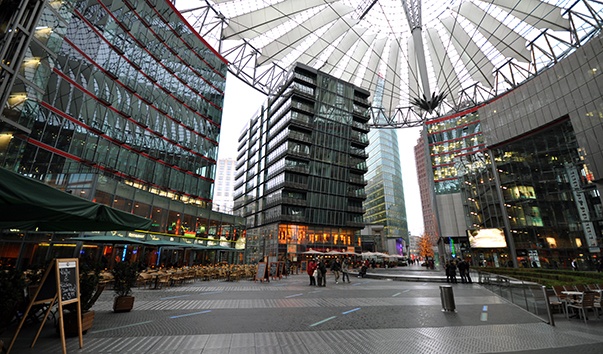
In the late 80's Hertha BSC had to play home games at the small Sport Park stadium due to the low attendance. West Berlin was squeezed in all senses and suffered from apathy. The fall of the Berlin Wall allowed the city to turn to the most interactive outdoor museum, but it was also great news for Hertha BSC. Not only the East part of Berlin but the whole federal state of Brandenburg came into its possession.
'The Old Lady' (or die alte Frau as German say for Hertha BSC) contains now 36,000 'Mitglieders' (members) and 306 fan clubs around the world. There is also good background for the creation of the strongest youth academy in the East Germany, a region which hasn't yet recovered from the 20th century affairs. By and large, right now, 25 years after the resumption of active life, Hertha BSC is collecting the best young talents in the region. However Benjamin Weber, the head of Hertha BSC football academy with whom we met in St Petersburg insists that in his organization nobody lives in cloud-cuckoo land.
"The most prolific producers of talent in Berlin are Hertha BSC, Union and TeBe. The list can also be completed by Hertha 03 Zehlendorf and Victoria. I don't like the words 'rivalry' or 'contest', because all these clubs together are creating good conditions for the players to grow up competing at good level", he says.
'Das Reboot' (the reform) which saved German football in the early 2000's was profitable for Hertha BSC. The Old Lady played regularly in Bundesliga and represented Berlin at the high level. Furthermore, the situation in region is benevolent for Hertha BSC in comparison with the regions like Nordrhein Westfallen or Ruhr where plenty of clubs hustle and bustle for every young talent. The Old Lady enjoys the possibility to skim the cream off the youth development centers located in Berlin and Brandenburg. In any case, we remind you that the result of the reform was the emergence of 366 such centers across the country.
The demand for the football classes forced the club to think about the coaching staff. In 2007 DFB set a special certification system for the coaches to ensure that every future pro would be taught by quality specialist, not angry gym teacher with a whistle. This idea was as good for the club development as a previous innovation. Several charismatic leaders who played for Hertha BSC in Champions League 16 years ago got the opportunity to stay in the club system instead of earning money only as TV pundits. So, U-15 team is now led by Andreas Zecke Neuendorf, U-17, by Michael Hartmann, U-19, by one of the best East Germany strikers Andreas Thom. You know Michael Preetz, the club sports director as your neighbor, otherwise you wouldn't reach these lines.
"They all give us a very strong advantage. They know the structure and the philosophy of the club, furthermore their hearts are blue and white, like Hertha BSC heart," says Benjamin Weber.
In the early 2000's Hertha BSC youth teams frequently won A- and B-Junioren-Bundesliga, but it has become difficult to succeed with the appearance of powerful structures like VfL Wolfsburg and especially RB Leipzig which seem to be going to collect all the young talents around the country by all means.
"It is great to have such competition," Weber speaks politically correct language. "Our kids have a great possibility to compete at good level from a very young age. No matter what RB Leipzig or VfL Wolfsburg do. We focus on our region, Berlin-Brandenburg. We have to recruit best kids at the right time, educate them, show them the way to the professional football, although we don't have so much money. The coaching system is the same. The main team coach is Pal Dardai who previously worked with youth teams. It means that we created our proper correct philosophy and we don't give up at the competitive level."
Indeed, they don't. Hertha BSC youth teams stand in both 'small' Bundesligas tables near the big companies 'kids' and defend the honour of the 'traditional' clubs. The Berliners alongside with Schalke 04 and TSV 1860 München produced the biggest quantity of the professional players for German football. On the other hand, one of the Russian coaches was pretty right shaking his head and grumbling: "Nothing's new, only old stuff" as he watched Michael Hartmann taking the lead of the FC Dynamo St Petersburg youth team at the Moskovsky stadium.
The basic principle of admission to Hertha BSC youth academy is a Dutch litmus abstractly entitled 'love for football'. There are neither tactics, nor physical exercises for the kids until they are 13. The sense of competition Benjamin Weber is speaking about is much more important. The U-10 teams inevitably play against U-11, those ones, in their turn, against U-12. What is reason for the seniors to play against juniors, Hertha BSC youth academy managers were asked during the seminar. One day this seniors will play against other seniors, was the answer. And this difference should be even more obvious.
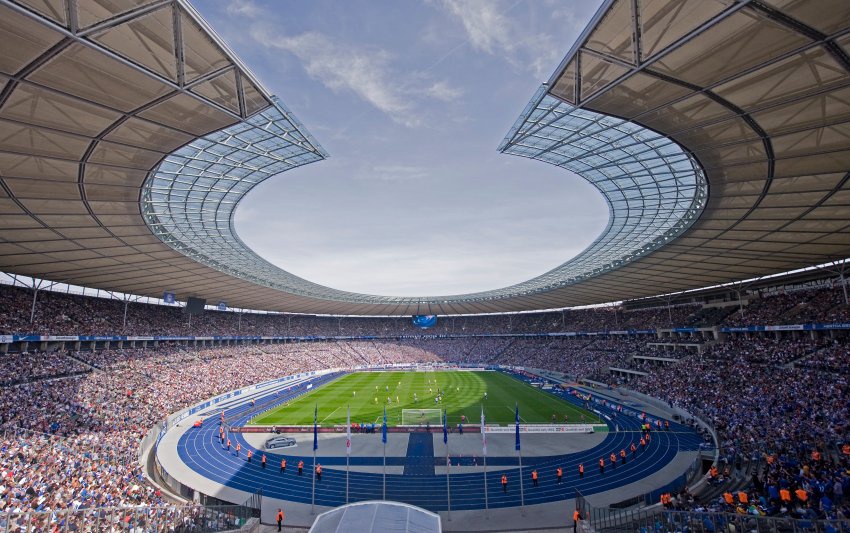
According to Weber, Hertha BSC Academy is to set three directions to the personality: school, football, and self-improvement. Don't be surprised, the ball handling is not on the first place. Football Academy is also a social project created with no purpose to graduate dummies from jokes. Even with an elaborated educational process only one or two players in a year become professional. The rest need to find themselves in other professional areas and should be ready for this search. Weber refers to specialists who derived a formula: if the kid is making magic tricks with a ball, but is learning bad, then, sooner or later, his football progress will stop too. Perhaps this is delusion typical for parents who use to wag fingers at their kids: "If you don't eat porridge, you will not go to play." But in fact it is pardonable, because Hertha BSC, as well as any other club with the same approach, is responsible to the country for many children (the selection over the whole land of Berlin-Brandenburg takes place every Wednesday, plus holidays), who will live in it and will do something for it. What would they do, pick up cigarette butts, work in a store, or save lives? They will make a choice themselves, with the help of a 'compass' they get at the academy.
Does it all mean that there will be no more stars like Mario Basler who used to smoke in the changing room or Stefan Effenberg with his famous 'middle finger salute'?
"Of course time has changed," Weber agrees. "I guess it's good for football and for society. Educating young generation like this we give clear example of how should professional footballer look like. On the pitch they progress on their technical skills and tempo, and that's the model of a modern player. Nevertheless, I don't think our system prevents the emergence of new charismatic characters."
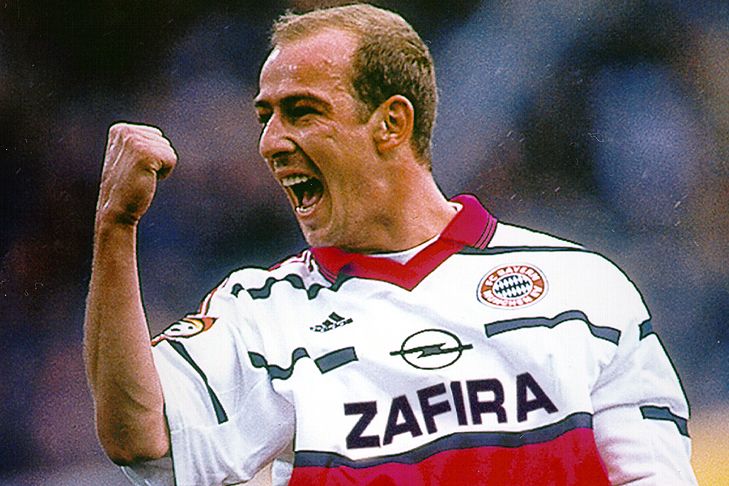
You can establish any philosophy you like. You can introduce a very high grade of certifying the coaches for all ages. You can build modern Academy with nine natural grass and two artificial pitches overlooking the block of the Olympistadion where the main team players enter the field by the sound of 'Nur nach Hause'. But all this efforts can produce only Potemkin village effect. The main thing is mentality.
"Actually, it all depends on the character and the will of the guys," one of the Hertha BSC coaches considers. "They always want to win, to play, to fight. It does make our work easier."
"We give the children the opportunity to see the home games of our main team, to feel the atmosphere of our big stadium, which is great regardless of whether we won or not. When you become a professional, when you play three games a week, you don't have time to watch the game," Weber seasons the motivation process with an emotional ingredient.
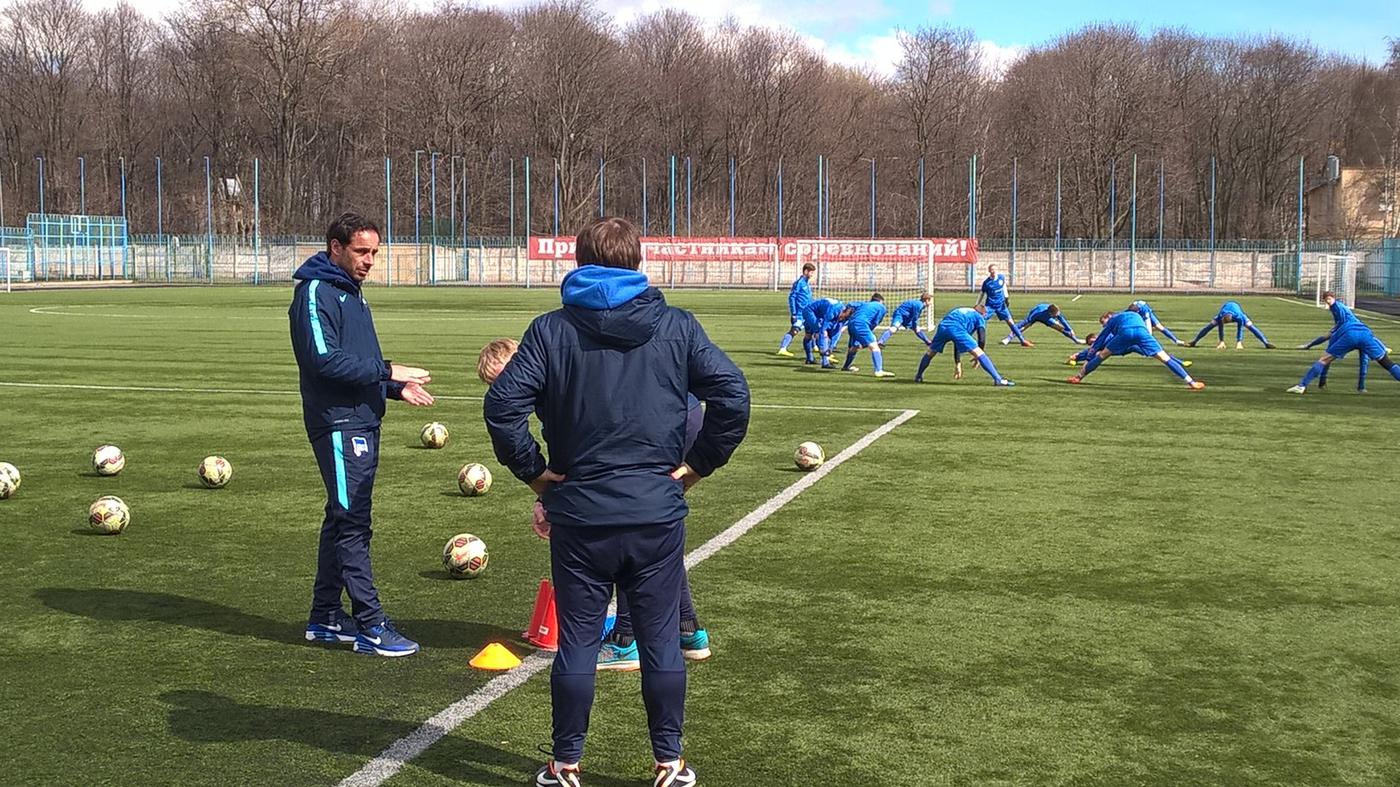
It's impossible to play football without passion. For the Czech coach Vlastimil Petrzela it was the key to 'discover America' in St Petersburg as he took charge at half-frozen FC Zenit team in 2003. Michael Hartmann and Tobias Jung not only proved that during the training sessions with FC Dynamo St. Petersburg youth team. They could act illusionists, because in front of three dozen spectators they seemed to revive the mummy of the priest Pa-di-ist from the Hermitage.
As the warm-up begun FC Dynamo youngsters were anxious. They seemed to expect to be vivisected by the foreigners. Meanwhile co-trainer Tobias Jung kept calm indicating errors and pushing the tempo. So the players went on moving, concentrated, the muscle memory started working and soon they had the momentum expected by the coaches. It seemed like the statues of sphinxes (there are dozen of them in Saint Petersburg) came alive.
The warm-up was not useless as the black snowy cloud came from the center of St. Petersburg. But Hartmann who had been waiting the team to start ball movement drills seemed to consider himself protected with an invisible umbrella. A man who played 240 matches for Hertha BSC and 2 for Germany national football team has a right to think so staying at the pitch of Moskovsky stadium.
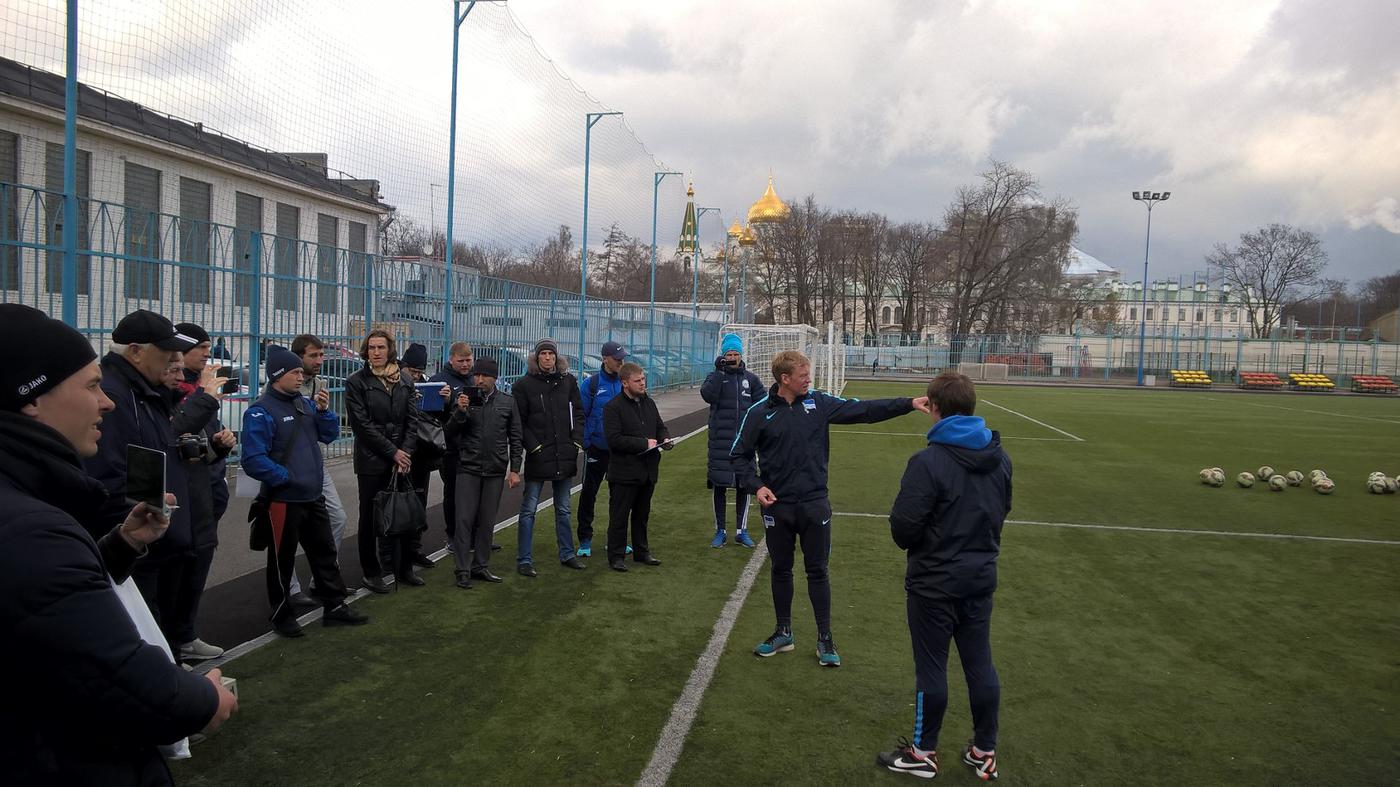
Hartmann kept on smiling like Mona Lisa, even when it became clear that the interpreter-girl couldn't keep up the pace of the training and was not as good in football terms despite the excellent knowledge of German. No shudder crossed Hartmann's face. The coach continued giving orders in German and didn't care about understanding.
A day before Tobias Jung was asked about the key elements of football education in Hertha BSC Academy. "First touch and receiving the ball," he replied. "Dribbling, control, the choice of the direction of the ball movement." All of this was shown on the pitch. You should have seen Hartmann reaching his goal, despite the fact that many players heard German for the first time in their lives. "He is to get mad," the audience whispered. And they were wrong about the coach. There was no irritation in his voice or gesture. He interrupted the passing if something got wrong, and explained with patience:
"If it is hard to receive the ball you should make 2 or 3 touches. You shouldn't pass the ball with one touch if your team-mate is not ready. When receiving the ball you should move your shoulders according to the direction of your pass. In this case almost all the pitch would be visible."
It took about 5 minutes to make players start moving their shoulders. Now it is clear that the pace in European is faster than Russian, but running is not a key factor.
"Don't hurry up! Take the right position on the pitch! Leave as few dead zones as possible."
Sometimes Hartmann was giving barely visible smile, but he never bothered to say "No, no, no" or "Stop it, stop it". And as the training session went on the footballers didn't look like guinea pigs no more. It turned out that one of them moved really fast, for someone it was easy to change the pace while the other one made no mistakes in passing. One training session is enough to see the future professional footballer in almost every young player. Everything else are journalistic clichés and witticism. Everything else does not matter.
As the wet snow began sticking to the eyelashes Hartmann surrendered.
"Thank you all for today. I hope you will never play in such conditions."
Despite the little natural disaster even the sceptics were sorry that the training session was over. Even more complicated things than football are powerless when it comes to excitement.
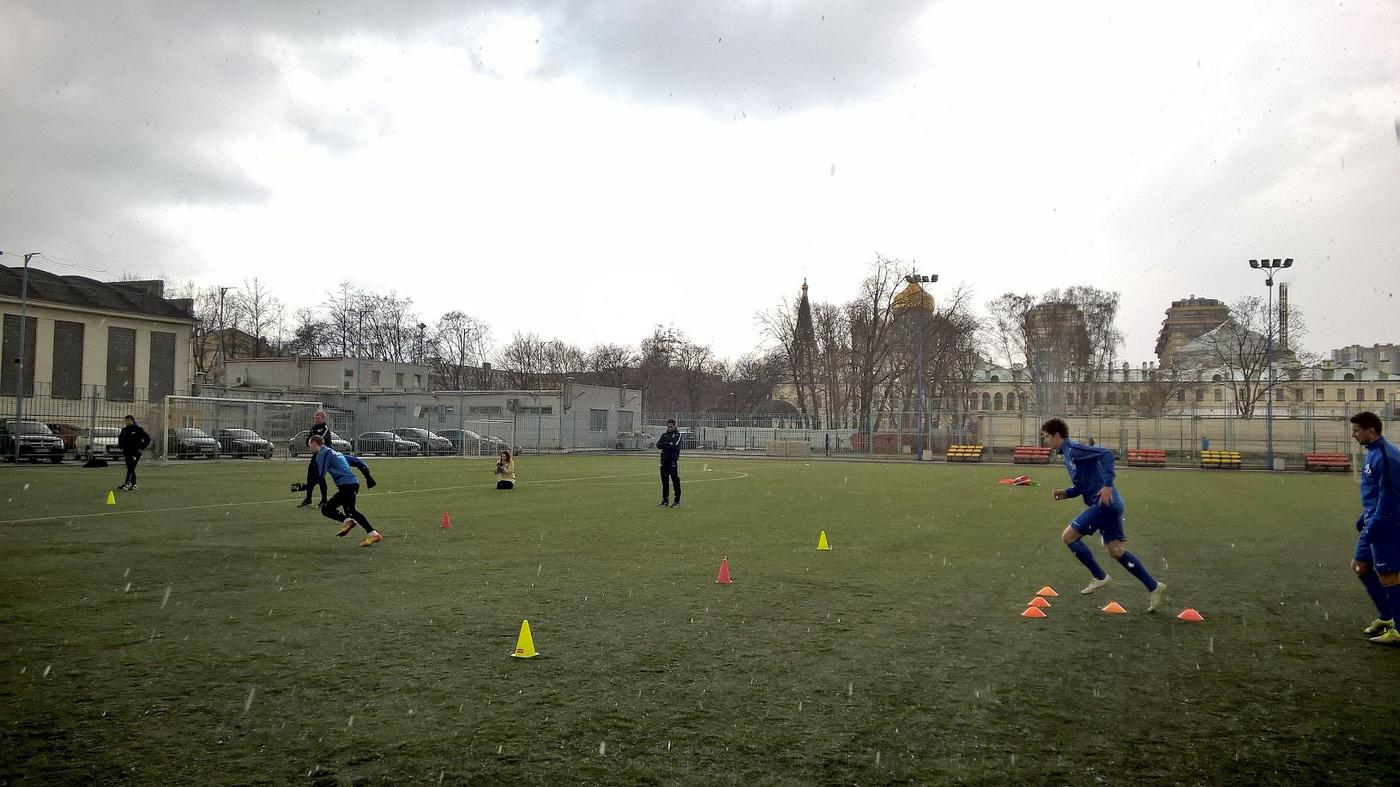
Alongside with Max Mittelstädt and Florian Kohls introduced thoroughly by Pal Dardai into the first team squad, tall central defender John Brooks which is also Hertha BSC Academy product plays regularly this season. And that's all.
"Of course we wish 11 Berlin-born players would be in Hertha BSC starting lineup, but it is not realistic. Nico Schulz played in all our youth teams, level by level, and eventually we were able to make our own product bring income as Borussia Mönchengladbach bought him. It means that the system is functioning," Weber insists.
Perhaps the greatest proof of the system functioning is Jerome Boateng without whom Joachim Low wouldn't go to the UEFA Euro 2016 in excitement. Unfortunately it was not a big deal (in literal sense) for Hertha BSC. Hamburger SV were wise to sign Boateng for €1.1 Mio and then sell him to Manchester City for €12.5 Mio.
"No one doubted that Boateng will be a great professional, because his skills were notorious at an early age. In general, he was one of the fastest players we've ever tested in the preview," Weber says.
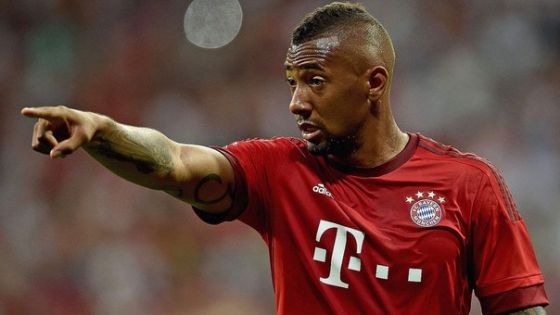
Nor Boateng doubted in his future refusing to sign 5-year contract deal offered by Hertha BSC. The Berliners then were at the middle of the table, casting fearful glances at the relegation zone.
It is not impossible for Hertha BSC to get into such a trouble again. It is obvious that they can't fight for the Champions League qualification every year. A hard competition existing in Bundesliga for all the teams from the second place to the 18th broke and goes on breaking plans of even more ambitious clubs. That's why all the players who look brilliant this season (Mitchell Weiser and Vladimir Darida, I guess) could leave Berlin in case they get a good offer. But as long as the club is protected by the youth Academy 'airbag' the reality doesn't look so scary. Only one day in week is fixed for an official meeting with the Academy representatives, but actually Michael Preetz and Pal Dardai meet with them every day. They want to know whom the main team can count on in the next future. Both Dardai and Preetz support the idea of giving young players the opportunity to show their abilities every day. If it is usual in the academies to take care of the education of young German citizens then the clubs are obliged to solve the national team problems with the weak positions in the different age categories.
"We have some people for the right flank of the defense, but there is lack of players on the left side," Benjamin Weber admits. "In the midfield, we have some players with good abilities, in the attack, another lack. True goalscorers do not appear every day, unfortunately. It's great that in the main team they count on left-footed Mittelstädt, but we should take a look at youth teams. Is there someone following his footsteps right now? For example, to find left fullback now we look whether there is such a central defender that would have not been too high, had good speed and at the same time would have been left-footed to play on the left side. This is a normal process for the youth system of the club. What if a guy doesn't want to change the position? Eventually the desire to continue professional career is stronger than momentary preferences. Mitchell-Elijah Weiser who started his career as a winger and this season agreed to substitute Peter Pekarik as a right fullback in the main team can be used as a good example. It is possible that Weiser would be eligible for the national team in his new capacity.
It would be right to consider Weiser the product of FC Köln academy, but the Hertha BSC idea is to bring up players not only for the club itself but for all the German football. This example makes Hertha BSC idea even more realistic.
Video/photo: Natalia Zhidkova